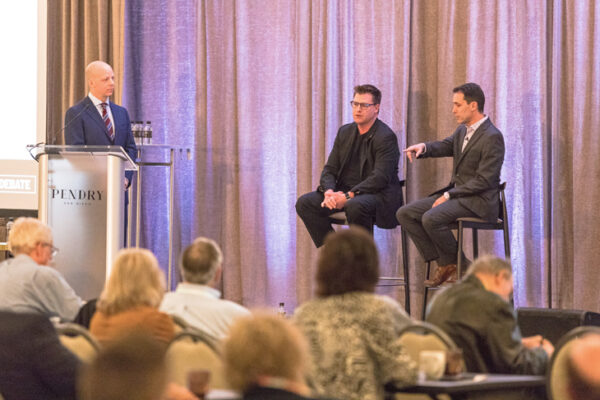Why the Doom-and-Gloomers Are Always Wrong
- From the energy crisis of the 1970s to pollution, famine, climate change and the next ice age, doom-and-gloomers are always predicting the “next big crisis.”
- Today, Nicholas Vardy explains what history has shown us about these doomsday predictions.
I remember joining my high school debate team as a lowly freshman in the late 1970s.
Each year, high school teams across the country debated the designated topic of that academic year.
The topic in my first year was the energy crisis – and how we could best solve it.
I never went on to have great success as a debater.
But I did take away a valuable lesson about “crises.” And to this day, I look at predictions of the next big crisis with a profoundly skeptical eye.
Let me explain…
The Energy Crises of the 1970s
The energy crisis was very much a part of my childhood.
It started with the Organization of Arab Petroleum Exporting Countries oil embargo in 1973. By 1979, the United States was suffering through its second energy crisis.
Revolution had broken out in the Middle East. Iran’s Ayatollah Khomeini had invaded Americans’ living rooms with chants of “death to America.”
Long lines once again appeared at gas stations. Public schools closed on the coldest winter days. President Jimmy Carter donned a sweater and urged Americans to lower their thermostats to 68 degrees.
The leader of the free nation even famously dubbed the energy crisis the “moral equivalent of war” (later mocked as the great “MEOW”).
Luckily, a small army of geeky high school debaters was working hard on how America could achieve energy independence.
Yet there was one argument that I bet even the national championship debate team never made: that the threat posed by the energy crisis was greatly exaggerated.
By the time I graduated high school three years later, memories of the energy crises had faded. Ronald Reagan was president. It was “morning in America.”
Back in the 1970s…
No one would have ever predicted that in 2019 the U.S. would surpass Saudi Arabia as the biggest oil producer in the world.
That gasoline would be plentiful.
And that car companies would be slowly phasing out the internal combustion engine in favor of electric vehicles.
Doom-and-Gloomers: A Terrible Track Record
History is littered with experts who predicted an imminent disaster of biblical proportions… and got it wrong.
The intellectual godfather of today’s doom-and-gloomers is Thomas Malthus.
In his 1798 An Essay on the Principle of Population, Malthus argued that human populations grow exponentially and food production grows arithmetically.
His gloomy conclusion?
Men should refrain “from pursuing the dictate of nature in an early attachment to one woman” and marry later in life and have small families. Otherwise, the world will run out of food and famine will ensue.
Of course, Malthus’ predictions never came to pass. But he was hardly alone.
Madsen Pirie, president of London’s Adam Smith Institute, recently compiled a list of failed doomsday predictions from the last 50 years. The list is impressive.
- 1966: Oil will run out in 10 years
- 1967: Famines by 1975
- 1968: Worldwide overpopulation
- 1970: World’s natural resources run out
- 1970: Ice age by 2000
- 1970: Water rationing in U.S. by 1974, food rationing by 1980
- 1971: New ice age by 2020 or 2030
- 1974: Satellites show new ice age is near
- 1976: Scientific consensus that Earth is cooling
- 1978: 30-year cooling trend continues
- 1980: Acid rain kills life in lakes
- 1980: Peak oil in 2000
- 1988: Regional droughts by 1990s
- 1988: Maldives underwater by 2018
- 1989: Nations will be wiped out if nothing done by 2000
- 2000: Children won’t know what snow is
- 2002: Peak oil in 2010
- 2002: Famine in 10 years unless we stop eating fish, meat and dairy products
- 2004: Britain will be Siberia by 2020
- 2008: The Arctic will be ice-free by 2018
- 2008: Al Gore predicts ice-free Arctic by 2013
- 2009: Prince Charles says we have 96 months to save the world
- 2009: Gordon Brown says we have 50 days to “save the planet from catastrophe”
- 2013: Arctic ice-free by 2015
- 2014: Only 500 days before “climate chaos”
What was the one thing each prediction had in common? It didn’t come true.
Not that this would ever stop Alexandria Ocasio-Cortez or activist teen Greta Thunberg from forecasting imminent disaster.
The Power of Human Ingenuity
Doomsday predictions are about more than just the relevant impending apocalypse.
They, instead, represent a conflict of visions about humanity itself.
Is our future constrained by the Earth’s ever-depleting resources… or will human ingenuity overcome all obstacles?
Charles Maurice and Charles W. Smithson at Texas A&M University studied the history of natural resources over 10,000 years.
Temporary scarcities in natural resources, it turns out, are the norm. And a temporary shortage in one resource always led to a better substitute.
A shortage of tin forced the Greeks’ transition from the Bronze Age to the Iron Age 3,000 years ago.
Timber shortages accelerated the rise of coal in 16th-century Britain. The shortage of whale oil in 1850 led directly to the first oil well in 1859.
It now appears that electric vehicles will gradually supplant cars.
The lesson?
Human ingenuity has always overcome crises that once seemed inevitable. So don’t buy into any doomsday scenario that predicts the imminent demise of our species.
As the cartoonist Charles Schulz advised, “Don’t worry about the world ending today. It’s already tomorrow in Australia.”
[adzerk-get-ad zone="245143" size="4"]About Nicholas Vardy
An accomplished investment advisor and widely recognized expert on quantitative investing, global investing and exchange-traded funds, Nicholas has been a regular commentator on CNN International and Fox Business Network. He has also been cited in The Wall Street Journal, Financial Times, Newsweek, Fox Business News, CBS, MarketWatch, Yahoo Finance and MSN Money Central. Nicholas holds a bachelor’s and a master’s from Stanford University and a J.D. from Harvard Law School. It’s no wonder his groundbreaking content is published regularly in the free daily e-letter Liberty Through Wealth.






